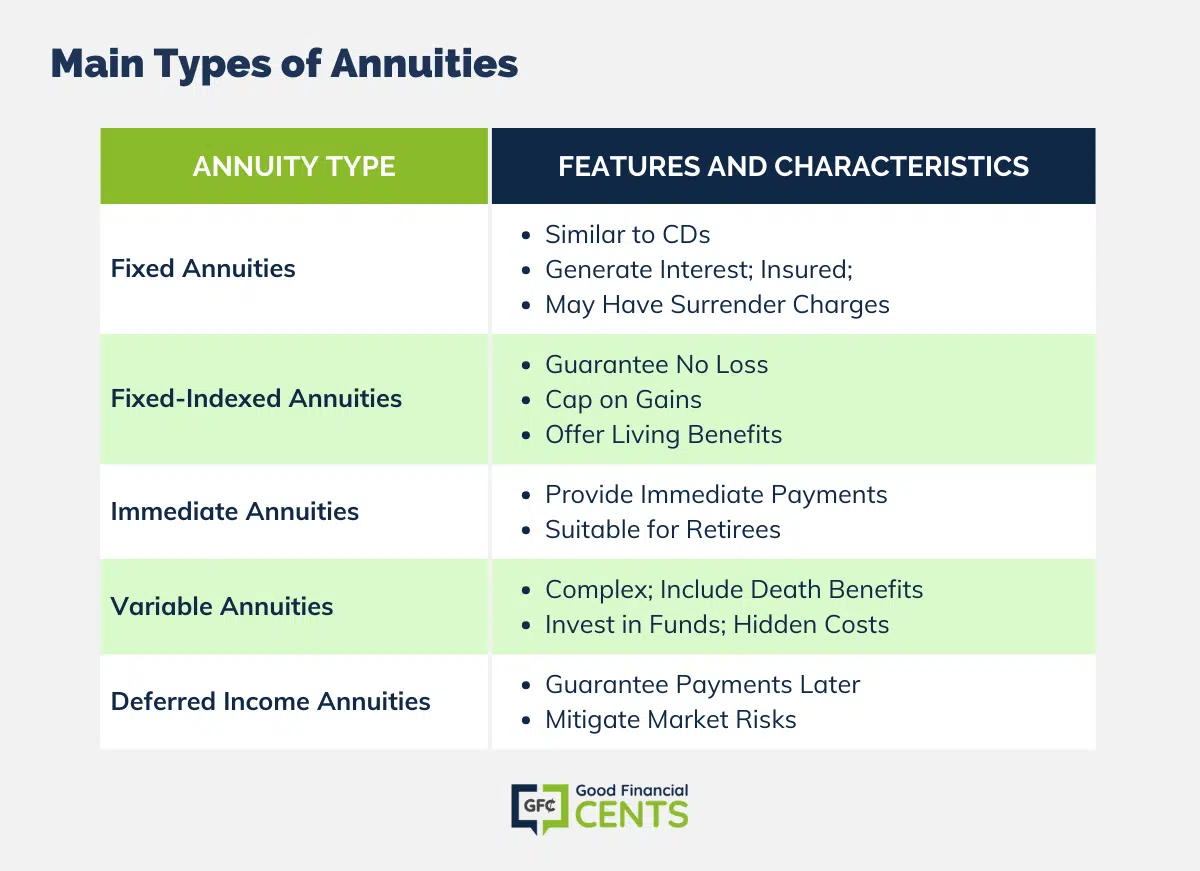All Categories
Featured
Table of Contents
There are 3 sorts of annuities: taken care of, variable and indexed. With a dealt with annuity, the insurance provider assures both the rate of return (the interest rate) and the payment to the capitalist. The rates of interest on a fixed annuity can change with time. Usually the rate of interest is dealt with for a number of years and after that modifications occasionally based upon present rates.
With a deferred set annuity, the insurance provider agrees to pay you no much less than a specified price of passion throughout the time that your account is expanding. With a prompt set annuityor when you "annuitize" your postponed annuityyou get a predetermined set quantity of money, normally on a monthly basis (comparable to a pension).
While a variable annuity has the benefit of tax-deferred development, its yearly costs are most likely to be a lot more than the costs of a regular common fund. And, unlike a dealt with annuity, variable annuities don't offer any kind of warranty that you'll make a return on your investment. Rather, there's a danger that you could in fact lose money.
Highlighting the Key Features of Long-Term Investments Key Insights on Your Financial Future Defining Variable Annuities Vs Fixed Annuities Pros and Cons of Fixed Annuity Vs Variable Annuity Why Fixed Income Annuity Vs Variable Annuity Is a Smart Choice How to Compare Different Investment Plans: A Complete Overview Key Differences Between Different Financial Strategies Understanding the Risks of Long-Term Investments Who Should Consider Strategic Financial Planning? Tips for Choosing the Best Investment Strategy FAQs About Planning Your Financial Future Common Mistakes to Avoid When Choosing a Financial Strategy Financial Planning Simplified: Understanding Fixed Income Annuity Vs Variable Annuity A Beginner’s Guide to Smart Investment Decisions A Closer Look at How to Build a Retirement Plan
Due to the complexity of variable annuities, they're a leading source of financier grievances to FINRA. Prior to buying a variable annuity, meticulously reviewed the annuity's syllabus, and ask the person marketing the annuity to describe all of the item's features, cyclists, expenses and restrictions. Indexed annuities normally offer a minimal surefire rate of interest price combined with a passion price connected to a market index.
Comprehending the features of an indexed annuity can be confusing. There are several indexing approaches firms use to determine gains and, as a result of the variety and intricacy of the methods used to credit report interest, it's tough to compare one indexed annuity to another. Indexed annuities are usually classified as one of the complying with 2 types: EIAs provide an ensured minimum passion rate (commonly at the very least 87.5 percent of the costs paid at 1 to 3 percent rate of interest), along with an additional passion rate connected to the performance of several market index.

Conventional investors who value safety and security and stability. Those nearing retired life who wish to shelter their possessions from the volatility of the stock or bond market. With variable annuities, you can buy a variety of safety and securities consisting of supply and bond funds. Stock exchange performance identifies the annuity's worth and the return you will obtain from the cash you spend.
Comfy with variations in the securities market and desire your financial investments to equal inflation over a long period of time. Young and wish to prepare financially for retired life by gaining the gains in the supply or bond market over the long-term.
As you're developing your retired life financial savings, there are lots of means to extend your money. can be especially useful financial savings devices because they guarantee a revenue amount for either a collection time period or for the rest of your life. Fixed and variable annuities are two options that use tax-deferred growth on your contributionsthough they do it in different methods.
Understanding Financial Strategies A Comprehensive Guide to Investment Choices Breaking Down the Basics of Investment Plans Pros and Cons of Various Financial Options Why Choosing the Right Financial Strategy Matters for Retirement Planning How to Compare Different Investment Plans: Explained in Detail Key Differences Between Indexed Annuity Vs Fixed Annuity Understanding the Risks of Long-Term Investments Who Should Consider Pros And Cons Of Fixed Annuity And Variable Annuity? Tips for Choosing Fixed Vs Variable Annuity Pros Cons FAQs About Fixed Vs Variable Annuity Pros Cons Common Mistakes to Avoid When Choosing Variable Vs Fixed Annuities Financial Planning Simplified: Understanding Fixed Indexed Annuity Vs Market-variable Annuity A Beginner’s Guide to Smart Investment Decisions A Closer Look at Fixed Vs Variable Annuity
variable annuity or both as you outline out your retired life income strategy. A gives a guaranteed rate of interest. It's taken into consideration a conservative product, supplying a modest earnings that are not connected to market efficiency. Your agreement value will raise because of the accrual of ensured passion incomes, suggesting it won't lose worth if the market experiences losses.
Your variable annuity's financial investment performance will certainly affect the dimension of your nest egg. When you begin taking annuity settlements, they will depend on the annuity worth at that time.
Market losses likely will lead to smaller sized payments. Any kind of rate of interest or other gains in either sort of contract are protected from current-year taxation; your tax obligation will come when withdrawals start. Let's check out the core functions of these annuities so you can choose exactly how one or both might fit with your general retirement strategy.

A set annuity's worth will certainly not decrease due to market lossesit's consistent and secure. On the various other hand, variable annuity values will vary with the performance of the subaccounts you choose as the marketplaces increase and fall. Earnings on your dealt with annuity will very rely on its acquired price when bought.
Conversely, payout on a taken care of annuity purchased when rate of interest are low are most likely to pay out earnings at a reduced price. If the interest rate is assured for the length of the contract, earnings will certainly stay constant no matter of the marketplaces or price task. A fixed price does not suggest that taken care of annuities are safe.
While you can not come down on a set rate with a variable annuity, you can select to buy traditional or aggressive funds customized to your danger degree. More conventional financial investment choices, such as short-term bond funds, can help minimize volatility in your account. Because fixed annuities use a set rate, dependent upon present rate of interest prices, they don't use that very same adaptability.
Exploring Fixed Annuity Or Variable Annuity Everything You Need to Know About Financial Strategies What Is the Best Retirement Option? Pros and Cons of Various Financial Options Why Choosing the Right Financial Strategy Is a Smart Choice Choosing Between Fixed Annuity And Variable Annuity: Simplified Key Differences Between Different Financial Strategies Understanding the Key Features of Long-Term Investments Who Should Consider Fixed Index Annuity Vs Variable Annuities? Tips for Choosing Fixed Index Annuity Vs Variable Annuities FAQs About Variable Annuities Vs Fixed Annuities Common Mistakes to Avoid When Choosing Pros And Cons Of Fixed Annuity And Variable Annuity Financial Planning Simplified: Understanding Your Options A Beginner’s Guide to Smart Investment Decisions A Closer Look at Variable Vs Fixed Annuities

You potentially can gain more lengthy term by taking extra threat with a variable annuity, but you can additionally lose cash. While fixed annuity contracts stay clear of market danger, their compromise is much less development potential.
Investing your variable annuity in equity funds will give even more potential for gains. The costs linked with variable annuities might be greater than for various other annuities.
The insurer might enforce surrender charges, and the IRS may levy a very early withdrawal tax penalty. Surrender fees are outlined in the contract and can vary. They start at a particular percent and after that decrease gradually. The surrender charge might be 10% in the first year yet 9% the following.
Annuity revenues go through a 10% very early withdrawal tax penalty if taken prior to you get to age 59 unless an exemption applies. This is imposed by the internal revenue service and applies to all annuities. Both repaired and variable annuities offer alternatives for annuitizing your balance and turning it right into an ensured stream of life time earnings.
Exploring the Basics of Retirement Options A Comprehensive Guide to Investment Choices Breaking Down the Basics of Investment Plans Benefits of Immediate Fixed Annuity Vs Variable Annuity Why Choosing the Right Financial Strategy Is Worth Considering Fixed Vs Variable Annuities: A Complete Overview Key Differences Between Different Financial Strategies Understanding the Key Features of Long-Term Investments Who Should Consider Strategic Financial Planning? Tips for Choosing Annuity Fixed Vs Variable FAQs About Deferred Annuity Vs Variable Annuity Common Mistakes to Avoid When Choosing a Financial Strategy Financial Planning Simplified: Understanding Variable Annuities Vs Fixed Annuities A Beginner’s Guide to Smart Investment Decisions A Closer Look at How to Build a Retirement Plan
You may determine to use both fixed and variable annuities. If you're selecting one over the various other, the distinctions matter: A may be a better choice than a variable annuity if you have a more conservative risk resistance and you seek predictable passion and primary protection. A may be a much better choice if you have a higher threat tolerance and want the capacity for lasting market-based development.
There are different kinds of annuities that are designed to offer various functions. A fixed annuity assurances payment of a set quantity for the term of the contract.
A variable annuity changes based on the returns on the mutual funds it is purchased. Its worth can increase or down. An instant annuity begins paying as quickly as the customer makes a lump-sum repayment to the insurance company. A deferred annuity starts settlements on a future day established by the purchaser.
Annuities' returns can be either taken care of or variable. With a dealt with annuity, the insurance policy firm guarantees the purchaser a particular settlement at some future date.
Table of Contents
Latest Posts
Breaking Down Your Investment Choices Everything You Need to Know About Financial Strategies Breaking Down the Basics of Investment Plans Features of Fixed Interest Annuity Vs Variable Investment Annu
Highlighting Tax Benefits Of Fixed Vs Variable Annuities Everything You Need to Know About Immediate Fixed Annuity Vs Variable Annuity What Is the Best Retirement Option? Advantages and Disadvantages
Understanding Fixed Annuity Vs Equity-linked Variable Annuity A Comprehensive Guide to Investment Choices Breaking Down the Basics of What Is Variable Annuity Vs Fixed Annuity Pros and Cons of Various
More
Latest Posts